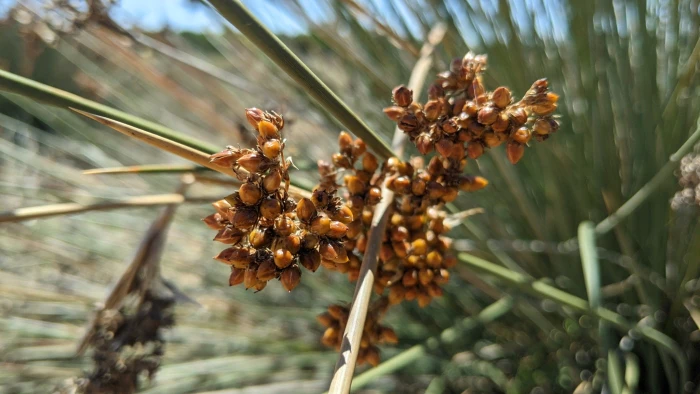Spiny Rush
/
(Juncus acutus)
Spiny Rush (Juncus acutus)
/

Dylan Butcher
CC BY 4.0
Image By:
Dylan Butcher
Recorded By:
Copyright:
CC BY 4.0
Copyright Notice:
Photo by: Dylan Butcher | License Type: CC BY 4.0 | License URL: http://creativecommons.org/licenses/by/4.0/ | Rights Holder: Dylan Butcher | Publisher: iNaturalist | Date Created: 2021-01-10T15:32:58-08:00 |














































































Summary
Juncus acutus, commonly known as Spiny Rush, is an evergreen perennial herb that thrives in coastal dunes, salt marshes, and along the margins of brackish and freshwater wetlands. It is native to multiple regions, including California and Baja California, Southern Europe, the Mediterranean, South America, South Africa, and the Middle East. It can grow up to 1.5 meters (4.9 ft) tall and forms dense, spiky clumps. The plant’s sharp-pointed leaves and stems are a distinctive brownish-green. Spiny Rush blooms in summer, producing small, brownish flowers that are not particularly showy but are interesting in their structure. The flowers are hermaphroditic and wind-pollinated, leading to the production of small, capsule-like fruits.
Spiny Rush is valued for its ability to stabilize soil and its tolerance of highly saline conditions, making it useful for erosion control in coastal areas. It is also used in constructed wetlands for wastewater treatment. In garden settings, it can be used to create a naturalistic or wildlife-friendly water garden or bog area. This plant requires full sun to flourish and prefers wet, poorly drained soils, tolerating both flooding and drought conditions. It is generally low-maintenance but can spread aggressively if conditions are favorable.CC BY-SA 4.0
Spiny Rush is valued for its ability to stabilize soil and its tolerance of highly saline conditions, making it useful for erosion control in coastal areas. It is also used in constructed wetlands for wastewater treatment. In garden settings, it can be used to create a naturalistic or wildlife-friendly water garden or bog area. This plant requires full sun to flourish and prefers wet, poorly drained soils, tolerating both flooding and drought conditions. It is generally low-maintenance but can spread aggressively if conditions are favorable.CC BY-SA 4.0
Plant Description
- Plant Type: Grass
- Height: 2-3 feet
- Width: 2-3 feet
- Growth Rate: Moderate
- Flower Color: N/A
- Flowering Season: Spring, Fall
- Leaf Retention: Evergreen
Growth Requirements
- Sun: Full Sun
- Drainage: Slow, Standing
Common Uses
Bird Garden, Deer Resistant, Drought Tolerant, Water Garden
Natural Habitat
Coastal dunes, salt marshes, and freshwater wetland margins
Other Names
Common Names: Sharp Rush, Sharp-Pointed Rush, Brwynen Lem, Luachair Bhiorach, ჭილი
Scientific Names: Juncus acutus, Juncus macrocarpus, Juncus maritimus subsp. acutus, Juncus acutus var. megalocarpus, Juncastrum acutum, Juncus acutus f. megalocarpus, Juncus acutus var. glomeratus, Juncus acutus var. xanthosus
GBIF Accepted Name: Juncus acutus L.
